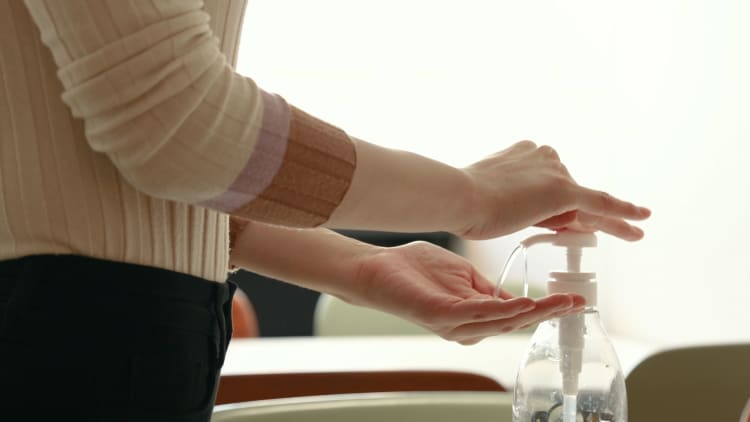When Myron Rolle, a former NFL safety with the Tennessee Titans, volunteered to treat COVID-19 patients as a third-year neurosurgery resident at Harvard Medical School and Massachusetts General Hospital, he felt as prepared as he could be.
"That comes from my football background, where adjustment and adaptation happen on the fly within a game," Rolle tells CNBC Make It.
The transition from professional athlete to Harvard-educated neurosurgeon to doctor on the front lines of the COVID-19 pandemic was relatively smooth for Rolle because each role has its similarities, he says.
"You never know what the other opponent is going to throw at you so in order [to be ready], you need to be able to be flexible. We all have to do that and I think it's something that we're all embracing and doing the best we can."
Rolle, 33, says he always knew he wanted to be a neurosurgeon, even during his college football days at Florida State University. In 2008, during his junior year, he was named a Rhodes Scholar (where he got the opportunity to study at Oxford University on a full scholarship).
After Oxford in 2010, Rolle made himself eligible for the NFL draft, where he was selected by the Tennessee Titans in the sixth round. Though he never appeared in a regular-season game, he knows all about the intense determination and dedication it takes to be a professional athlete.
Now as a emergency room doctor treating patients who come off the streets with COVID-19-like symptoms, Rolle, along with his colleagues, is working in 24-hour shifts at the hospital.
"You get in early, at 4 or 5 a.m. and sometimes that 24 hours extends because you have some extra paperwork to finish up before you head home and pass off to the next resident who takes over for 24 hours," Rolle says.
Before the start of each shift, Rolle says its like going through "airport security." Healthcare workers have to line up to get a mask and then show that they're symptom free of COVID-19 through an app that Mass General developed.
"Once you are cleared for work that day, security will let you into the hospital," he says.
When he enters, he then sanitizes his hands and puts on his personal protective equipment, or PPE, which includes a gown, face mask and gloves.
The ironic part, he says, is that once you get inside the hospital is eerily empty.
"There aren't that many people walking around. The [operating rooms] are not really buzzing like they typically would be," he says.
Normally, the operating room is where Rolle would spend much of his time. Mass General usually has about 10 to 12 surgery rooms running throughout the day, he says, but now maybe one or two are actively used.
"[A]nd that is going to reduce even more," he says, as more operating rooms are now being turned into intensive care units for COVID-19 patients.
And instead of removing brain tumors Rolle is now tasked with getting patients' oxygen saturation levels up.
As an ER doctor, Rolle says he tries "to get in and get out as quickly as possible" when dealing with patients infected with coronavirus to limit his risk of exposure.
Nurses, he says, are the true heroes on the front lines, as they are the ones seeing patients multiple times throughout the day, re-exposing themselves to the virus each time.
As far as his own health goes, Rolle says he's lucky if he's able to grab an hour of two of sleep during his 24-hour shift.
"Typically your pager is going off all the time, so even if you do get an hour [to sleep], within 30 minutes its disrupted by a page," he says.
"[I] haven't had many shifts were I had the chance to get some quality rest."
Instead Rolle found little ways to stay healthy and keep his spirits high.
"I do pray," he says. Praying and reading the Bible have helped him "tremendously" during this chaotic time.
"Also, my wife is not with me here. She is down in Georgia, we are maintaining separate spaces right now because I want to protect her as I'm coming in and out of this hospital," he says.
But his daily video calls with her help him to take his mind off of the tragedy that he is witnessing every day inside the hospital..
Rolle also squeezes in mini workouts when he can by going on short runs outside his condo or by doing some pushups before his shift.
"[I] run the stairs in my building. It goes up to 36 floors, so I run those 26 floors on the stairwell and try to get some activity in that respect," he says.
He says working out helps to keep him focused.
"[A]nd it gets me back into thinking that I'm about to suit up for the Titans on Sunday or something."
Check out: The best credit cards of 2020 could earn you over $1,000 in 5 years
Don't miss:



